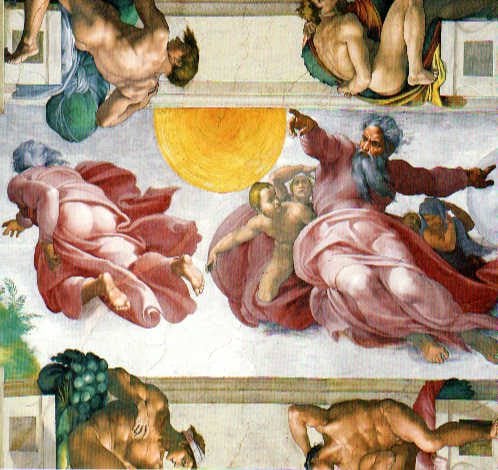
Michelangelo Buonaroti (Wikimedia CC public domain)
I share a few thematically related passages from William E. Carroll, Creation and Science: Has Science Eliminated God? (London: The Incorporated Catholic Truth Society, 2011). William Carroll is (or, anyway, was) the Aquinas Fellow in Theology and Science at Blackfriars, in the University of Oxford, and he unsurprisingly takes a very Catholic view of things.
If one were to read the opening of the Book of Genesis without any reference to the history of Christian thought, it would not be immediately obvious that the first words, “In the beginning God created the heavens and the earth,” are an affirmation of creation out of nothing. (10)
To which I reply, “No indeed, it would not.”
[S]cholars do not agree on how properly to translate the word bara, the word which becomes creavit in the Latin translation. It is not clear, from a purely linguistic point of view, that the Hebrew verb necessarily means to create out of nothing. . . . Most biblical scholarship today would deny that we can find in the Bible any clearly unambiguous commitment which excludes God’s using pre-existent matter in what Scripture refers to as creation. (11)
Quite so.
As we shall see, it is the Fourth Lateran Council of 1215 which provides the first doctrinal definition of creation. (13)
The Christian doctrine of creation is made explicit in the decrees of both the Fourth Lateran Council (1215) and the First Vatican Council (1870), and these texts provide the normative statement of what it means to say that God is the Creator. Thus, any discussion of creation and science ought to begin with the clear understanding of creation set forth in these two councils. (16)
There is no pre-existent material which God uses in the act of creating. Creation is not a transforming of formless material into the structure of the world; creation is the complete and total production of all that is. (21-22)
The key to Thomas Aquinas’ analysis is the distinction he draws between creation and change, or, as he often remarked, creatio non est mutatio (creation is not a change). . . . Creation . . . is the radical causing of the whole existence of whatever exists. To cause completely something to exist is not to produce a change in something, is not to work on or with some existing material. If, in producing something new, an agent were to use something already existing, the agent would not be the complete cause of the new thing. But such complete causing is precisely what creation is. (23-24)
To avoid confusion, we need to recognize the different senses of how we use the term “to create.” We often speak of human creations, especially with respect to the production of works of art, music, and literature. What it means for God to create is radically different from any kind of human making. When human beings make things they work with already existing material to produce something new. The human act of creating is not the complete cause of what is produced; but God’s creative act is the complete cause of what is produced; this sense of being the complete cause is captured in the expression “out of nothing.” (25)
Posted from Seaside, Oregon












